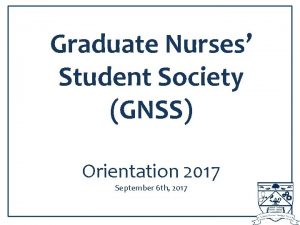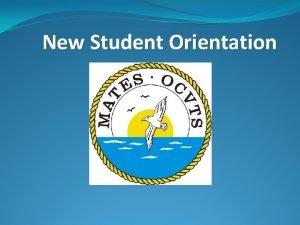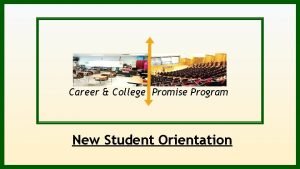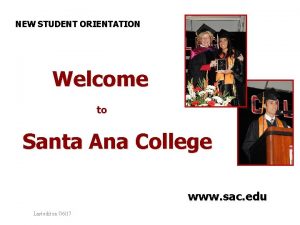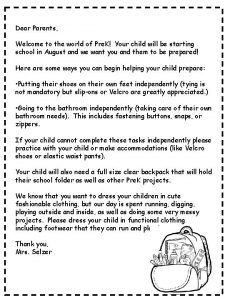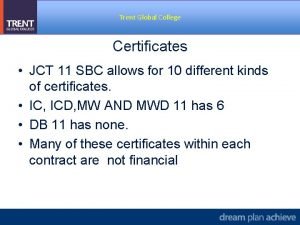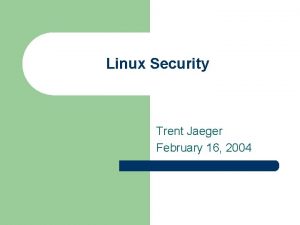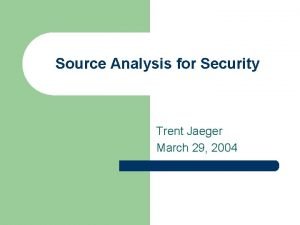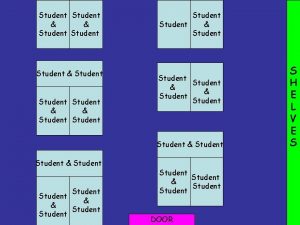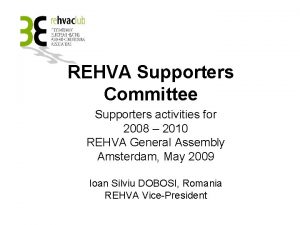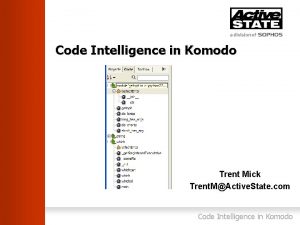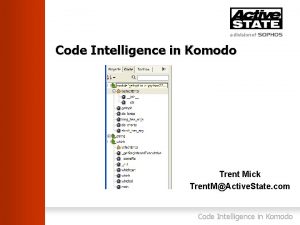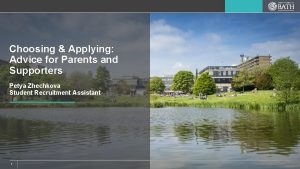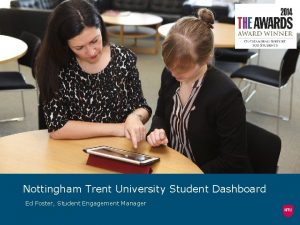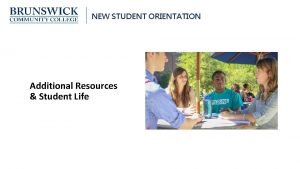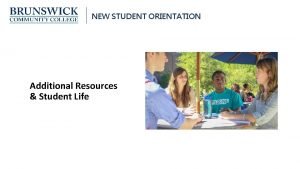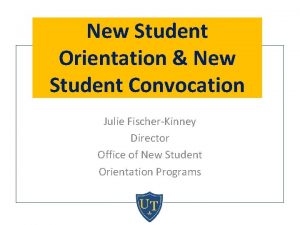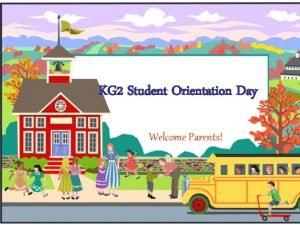Welcome to Trent New Student Orientation Parents Supporters





























- Slides: 29

Welcome to Trent! New Student Orientation – Parents & Supporters NONA ROBINSON – ASSOCIATE VICE PRESIDENT STUDENTS

Trent University Experience

Agenda • • Introduction COVID-19 planning update Common anxieties Students and families transitions Student strengths and development Challenges, resources and referrals Talking with your student When things go wrong … Optional at the end: Q&A about residence * Content note: we will be talking about some difficult issues that could affect students, including mental illness, sexual violence, and suicidality. We will focus on prevention and support resources. If you would like a copy of this slide deck, please email nonarobinson@trentu. ca

Introduction • How this webinar will work (hopefully!) • What people like me do, and why we love it • Please Q&A: ◦ What is something you expect your student will experience in university? ◦ What is a change you think will take place? • Expectations, dreams and changes

COVID-19 Planning Update • Trent Forward: https: //www. trentu. ca/coronavirus/ • Preparing campus infrastructure • Resources and support for students, faculty, staff and visitors including work/study-plans, health and safety, and wellness screening • Teaching and learning support for online learning, health, transit and housing resources and capacity • Communication and engagement (including increased summer communication to students • Contingency planning

Common family anxieties • Please Q&A: ◦ What is something you are anxious about? • Common anxieties: ◦ Student will lose touch ◦ Student won’t like university courses ◦ Student won’t make friends ◦ Student will make too many friends! ◦ Student will be disappointed ◦ Bad things will happen ◦ Student will change beyond all recognition

Transitions • Think about major changes in your life. What were some challenges? What gave you satisfaction? What were the emotions you experienced? • What are some ways that your student may need to manage their transition?

Transition Theory Situation Trigger, timing, control, duration, experience, concurrent stress, assessment Strategies Modify situation, control meaning, manage stress Adapted from Schlossberg, N. K. (1984). Counseling adults in transition: Linking Practice with Theory. New York, New York: Springer Publishing Company, Inc. . Self Personal/demographic, Psychological resources Support Relationships, family, friends, institutions/comm unities

Transitions in first year • Please Q&A: ◦ What is something you expect your student will need to learn to be successful? • Academic • Financial • Social • Physical and mental health • Risk-taking • Establishing independence, personal autonomy, and responsibility

Student success factors • Motivation • Self-confidence • Connections: academic and with campus • Self-reliance • Skill development • Early identification of issues and help-seeking

Your student’s strengths • Looking at the areas your student may find challenging, think about what your student’s strengths are. • Please write down for yourself: ◦ What are three examples of strengths your student has? • How can those strengths help your student to succeed in these areas? • Please chat: ◦ One of your student’s strengths and how that will help them succeed

Current Students website - resources

Academic supports • Academic Advisors – one in each college ◦ Academic pathways, advising on challenges, forms/petitions, graduation checks • Academic Skills Instructors – one in each college ◦ Take the University Challenge, individual appointments, online & in-person workshops, online resources • Registrar’s Office • Faculty and teaching assistants • Academic departments (especially for choosing major) www. trentu. ca/advising

Career pathways support • Never too soon to start planning skills development, academic pathways, and goals • Students can expect to change careers (not jobs) on average 5 -7 times; what are transferable skills? • Co-curricular record • Career. Space – Located in the Student Centre; online resources, advising, counselling • Having clear goals and motivation helps with academic success www. trentu. ca/careers

Financial supports • Financial Aid Office ◦ ◦ ◦ OSAP Bursaries Scholarships Trent Work-Study Program Emergency loans www. trentu. ca/financialaid RESP Verification of Enrolment: www. trentu. ca/registrar under “Forms”

Social supports • Summer Connect and Fall Orientation • College, residence and off-campus student activities • Student clubs and student levy groups • University and student events • Trent Central Student Association and College Cabinets • Co-Curricular Record; Impact Leadership Training • Hanging out with friends Office of Student Affairs www. trentu. ca/studentaffairs Trent Central Student Association www. trentcentral. ca Trent Colleges: www. trentu. ca/colleges

First Peoples House of Learning • Available to all students; programming particularly intended to support Indigenous students • Outreach to students who have self-identified through application or other contacts with FPHL • Gathering Space, traditional areas, elders and knowledge-keepers, cultural programming • Indigenous student financial support, academic advising, tutoring, student mentorship • Cultural counselling www. trentu. ca/fphl

Physical health supports • Health/physical concerns ◦ Irregular eating, sleeping habits ◦ Severe allergy management ◦ Stress & anxiety ◦ Prescription medication ◦ Substance abuse • Health Services – www. trentu. ca/healthservices ◦ Helpful to have immunization record, first aid kit, any necessary medications • Athletics Centre – www. trentu. ca/athletics ◦ Providing online fitness support, some in-person fitness activities if feasible ◦ In non-COVID times, fitness classes, intramurals, varsity sports • Food Services -- www. trentu. ca/foodservices

Mental health • Most common mental health concerns: ◦ Stress and anxiety ◦ Depressive episodes • Major mental health issues • Signs & symptoms to be aware of • Residence dons, colleges, Counselling Centre, Accessibility Services Office, peer support www. trentu. ca/counselling www. trentu. ca/sas

Sexual assault prevention • Sexual assault refers to all incidents of unwanted sexual activity, including sexual attacks and sexual touching. • 82% of assaults committed by someone known to the survivor. More than half of reported sexual assaults involve alcohol use. • Enthusiastic consent • Being an intervener: directly; as a distraction; or call for help • Conversations about preventing sexual assault, watching out for each other • Being aware of building security and safety • It’s never your fault if you’re sexually assaulted www. trentu. ca/sexualassault

Questions about services and support?

Speaking with your university student - role play • Watch the first role play – what were some problems? What would you do differently? • With the second role play – what were some key differences? What did you think was particularly effective? • Please Q&A: ◦ What resonated with you watching these?

Independence and autonomy • What role do family members play? • What are your expectations of your student, and how can you help to meet them? • What will help you feel confident in your student’s personal autonomy? • What will shake your confidence, and how will you cope? • What future directions will your student take?

Active listening • Prompting (verbal and non-verbal) • Asking open-ended questions (versus yes/no questions) • Listening for and validating feelings • Paraphrasing for understanding not • Jumping in • Going straight to advice

Empowerment and raising a concern • That sounds really difficult. What have you tried so far? • What would be helpful for you right now? • Have you talked with anyone about this? When you do ______ , I feel _____ / It does _____ (impact) It would be really helpful if _____.

Conversation checklist • • • Money – where’s it coming from, how is it being spent Academic expectations – yours and your student’s Living arrangements and any changes to them Communication frequency Managing emotional situations Raising a concern with each other – how you will do it

When you start to worry … • Encouraging autonomy – what can your student do to make the situation better? • Seeking more information – website, resources • Contact us if you need to. My email is nonarobinson@trentu. ca (on the handout as well) • A bit about privacy issues • Remember: Your student will turn to you, or their friends, or the internet, or us. The more they can access supportive and accurate information at the right time the more likely they are to succeed

Good luck!!! • Questions? (After this, optional residence life discussion) Office of Student Affairs studentaffairs@trentu. ca www. trentu. ca/studentaffairs (705) 748 -1011 ext. 7125 Nona Robinson nonarobinson@trentu. ca (705) 748 -1011 ext. 7122

Optional – Residence life • Residences converted to single rooms only, other precautions to encourage social distancing and limit high touch surfaces • Cleaning of common areas, high touch surfaces, and bathrooms • Designated bathroom areas • Single-use containers (sadly!) rather than china/metal cutlery in dining halls. Still can use meal plan in all open food outlets; unused meal plan carries 100% over to following year • Safety expectations and community standards based on Public Health recommendations • Residence life programming and support still being delivered, with some remote options (e. g. “Donline”)
 Green eggs early childhood centre
Green eggs early childhood centre Gsu new student orientation
Gsu new student orientation Penn state factbook
Penn state factbook Texas state new student orientation
Texas state new student orientation Occ new student orientation
Occ new student orientation My.college cpcc
My.college cpcc Santa ana college cost per unit
Santa ana college cost per unit Geocentric supporters
Geocentric supporters Reveals that his supporters will be made earls
Reveals that his supporters will be made earls Andrew jackson and his supporters believed in apex
Andrew jackson and his supporters believed in apex Frida kahlo famille arbre généalogique
Frida kahlo famille arbre généalogique Parents parents
Parents parents Frida kahlo famille arbre généalogique
Frida kahlo famille arbre généalogique Polycentric company
Polycentric company Welcome to the parents world
Welcome to the parents world Welcome dear parents
Welcome dear parents Welcome parents and guardians
Welcome parents and guardians Trent hoover wrestling
Trent hoover wrestling Trent global college
Trent global college Trent 8104
Trent 8104 The final decrees of the council of trent
The final decrees of the council of trent Trent global college review
Trent global college review Problems in the catholic church reformation
Problems in the catholic church reformation Trent 2018
Trent 2018 Operating system security trent jaeger
Operating system security trent jaeger Fnrpm
Fnrpm Council of trent ap euro
Council of trent ap euro Emma trent
Emma trent Trent jaeger
Trent jaeger Trent deckard
Trent deckard

